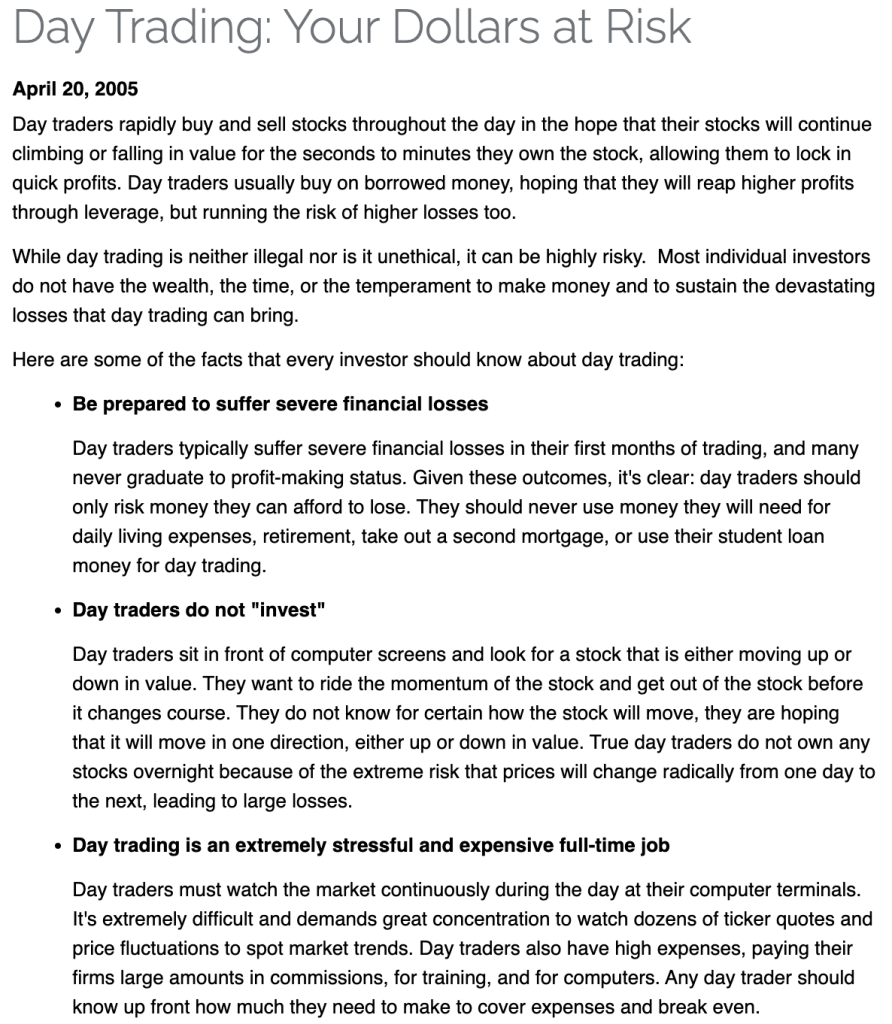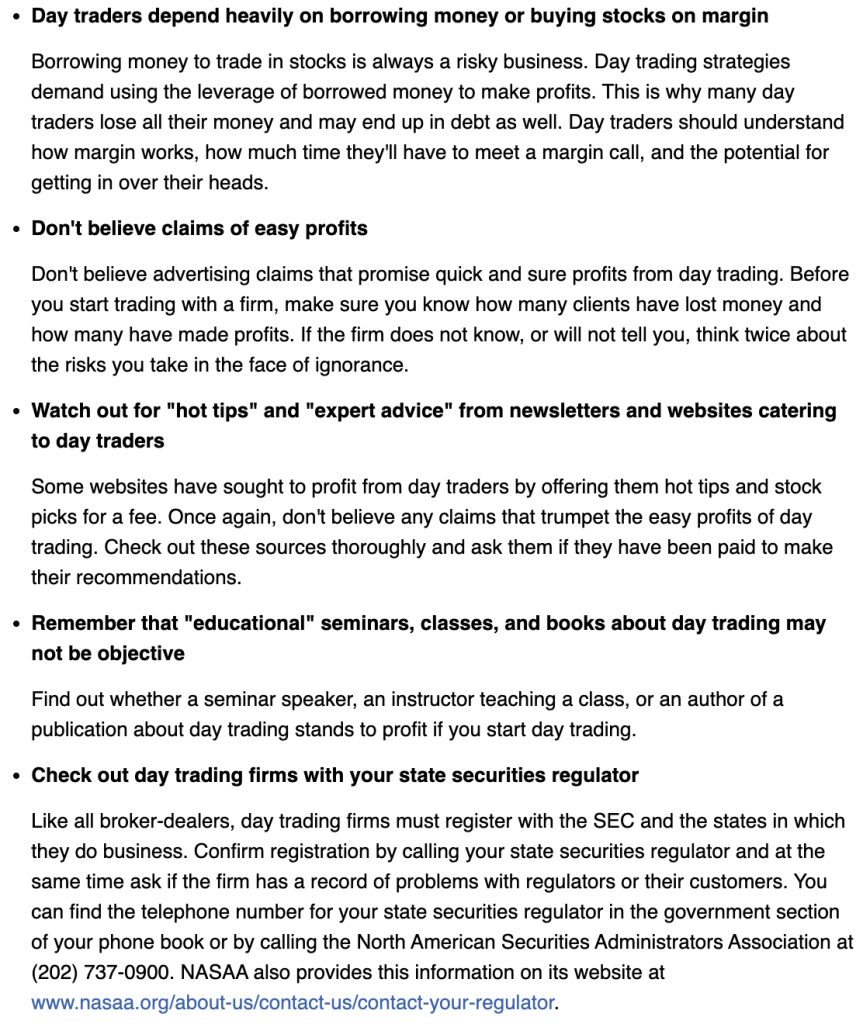 By Dr. Jim Dahle, WCI Founder
By Dr. Jim Dahle, WCI Founder
Not long ago, I had a white coat investor write in with an email titled “Recommendation for a side gig.” The recommended side gig? Trading stocks. The email went something like this:
“I've had market-beating success for almost two years now by learning the methods taught and proctored by these guys, using their software and participating in their program. Now, it takes me only about 45 minutes every morning to choose swing trades (or not), and I generally make several hundreds or thousands per week on average. Last year, I made about an 8% gain in the stocks I traded with the methods, without using margin, which would have doubled my returns, whereas the rest of the market was down double digits. The founder and chief coach made about 60% last year (using a margin account). In good (market trending) years, they claim even better results. I was initially skeptical about some of the claims for potential gains, and I'll grant you some of the results sound too good to be true, but I have become convinced the methods are sound, for both up and down markets, and the guys in charge are legit . . . I think the founder might make an interesting blog interview at least.”
I took the emailer at his word that he was trying to share something that he legitimately felt was helpful for him and would be for other white coat investors. However, the email sounded an awful lot like the spam comments left all over this blog nearly every day. There must be hundreds or even thousands of people out there selling their software and systems to help you successfully trade stocks, options, crypto, and whatever else. While I wished the WCIer well and asked him to stay in touch to let me know how his methods have gone over the years, I didn't rush out to line up a blog or podcast interview with the founder of this system.
A Bogleheads post a few days later was titled, “18 to 100 percent annual return fund.”
“One of my acquaintances referred me to this guy for investment. This financial guru who runs his own fund is claiming that he generates up to 100% annual return with his option strategy and that too consistently and without a risk of loss. He says less than 20% annual return is really bad. Is it possible? Am I missing something here? I have never seen such a confident financial guru before. Also I have never heard about his company before. Have you?”
“Up to” are two of my favorite words. And 100% without a risk of loss? I mean, who wants to settle for a mere 19% return when you can get “up to” 100% without any risk of loss? Weird that you've never heard of this company before despite that incredible track record (that's sarcasm by the way).
I don't “trade” and I thought it might make for an interesting blog post to explain why. Perhaps it makes me sound old-fashioned or boring or like an ostrich with my head in the sand, but it reminds me of a sticker on the dash of my father's Super Cub, a backcountry plane in Alaska, which read:
“There are no old, bold pilots.”
I have met precious few older, wealthy investors who got that way by trading stocks. In fact, I don't know of any. Most of the wealthy people I know worked hard, perhaps built a business they controlled, saved a bunch of money, invested it in some reasonable way, and waited. They didn't make their money putting it all on red, and they didn't make their money sitting in their basement buying and selling Apple every few hours.
What Is Trading?
If you've never been exposed to this world, it's pretty interesting. Those involved sometimes classify themselves by how long they hold their positions:
Scalp trading: Seconds to minutes Day trading: Less than one day Swing trading: Days to weeks Position trading: Weeks to yearsThis is all very different from what I do, which is best described by Nick Maggiulli in the title of his book Just Keep Buying. A trader is trying to buy low and sell high. They really have no interest in the asset or business they are purchasing. They don't want to run it. They aren't interested in its long-term success. They don't even really care if it goes bankrupt next week. They aren't buying to enjoy their share of its profits in the coming years and decades like an investor. They're buying in hopes that the value increases before they sell.
They do this based on all kinds of things. Perhaps they study daily economic news and try to gauge how the market will react. Maybe they study charts and use “technical analysis” (they use that term because it sounds better than black magic) to divine the future. They capitalize on short-term momentum. They use software to comb through massive quantities of data. They use a “system” (although it always seems like they have a new one that they've just been using for the last few months or years). Or they just flat-out gamble.
Whatever. It's fun. Lots of docs were doing this between patients in the late 1990s. Most of them learned their lesson by the early 2000s, but maybe now day trading is coming back into vogue.
Why I Don't Trade Investments
Let's go over 11 reasons why I don't do this.
#1 Trading Doesn't Add Any Value to the World
I am financially independent (FI). That means I don't have to work for money. Do I still work? Yes. But the alternative activity is to go have fun. So, if I'm not enjoying my work and if I don't feel like my work is contributing to the world, I'm not going to do it. I don't have to do it to reach my financial goals. Even if you aren't yet FI, you probably don't have to either. All this to say, even if trading actually worked, I still probably wouldn't do it.
#2 I Don't Enjoy Trading
I like rafting. I like climbing. I like canyoneering. I like ice hockey. I like spending time with my kids. I even enjoy video games. I like stitching up faces and putting in chest tubes. I even like trying to figure out why someone has belly pain or helping a family decide what to do about grandma's sepsis. But I don't like staring at a computer screen for 45 minutes every morning trying to decide what to buy and sell.
Investing for me is a chore. Once a month, I've got to go in and put in a couple of trade orders to move the money I just made out of cash and into a mutual fund. Or I have to fill out some forms and wire some money to buy into a real estate partnership. Or I have to Venmo my niece a few hundred dollars for her college rent and pull out a corresponding amount from the 529 I started for her. That's not that fun. I'm sorry. If you're trying to have fun with your investments, you're probably not a very good investor.
More information here:
#3 Trading ‘Returns' Are Usually Not Risk-, Tax-, or Effort-Adjusted
Lots of traders report incredible returns. Many traders are simply lying, especially if they're trying to sell you something. Others are incompetent at calculating their own returns. But even those who are honest and competent are rarely adjusting their returns for some rather important things, such as risk. If the stocks you are buying in and out of are all tiny tech companies, an appropriate comparison is a small cap tech index fund—not the S&P 500. Apples to apples. In addition, short-term capital gains are all taxed as ordinary income. I don't know about you, but that marginal tax rate is 45.8% for me in a taxable account.
You can (and should if you must do so) trade in a tax-protected account. It can almost double your after-tax return. At any rate, I don't recall a trader ever reporting after-tax returns to me.
In addition, one must account for the value of their time, effort, worry, and anxiety. Consider the doc who emailed me. Forty-five minutes every weekday morning is almost four hours a week. If a doc's time is worth $250 an hour, that's $1,000 right there. “I make several hundred per week on average.” Yes, but you're also spending several hundred per week on average. You could just see a couple more patients a day, do more good in the world, and probably come out ahead. Or you could spend that time on something that improves your wellness and extends your career and even your life enough that it makes an even bigger financial difference. I know what my time is worth, and you should, too.
#4 Trading Causes a Tax Nightmare
Short-term stock traders, even if successful, pay short-term capital gains taxes (i.e. ordinary income taxes) on their wins. Their dividends, should they receive any, are not qualified. So, they're taxed at ordinary income tax rates, too. Imagine someone who traded 250 days a year and made 10 trades a day. That's 2,500 transactions a year. My Vanguard Consolidated 1099 already goes 15 pages or so every year. Imagine how long it would be with another 2,500 transactions on it. I guess software can move it directly into your tax return, but still, keeping track of it would be a nightmare.
A long-term, tax-efficient buy-and-holder like me pays taxes ONLY on dividends in a typical year, and those are taxed at the lower qualified dividend rates. The only time I ever sell a security is to tax-loss harvest it. Selling something with a gain? What a rookie move, at least from a tax perspective (and during the accumulation years).
#5 Gambling Addiction Is Real
It feels good to make money on a stock in just a few hours. It hurts to lose money. These activities stimulate the same areas of our brain that are stimulated in a casino. While you will hear traders justify their actions, I think a significant percentage of them just flat-out enjoy gambling. Gambling is probably fine to a certain extent, I suppose. If you go to Vegas with $400 you're planning to gamble away and you gamble it away while having fun, great! But a certain percentage of gamblers get addicted and ruin their financial lives. A serious long-term investor doesn't have that risk.
Heck, if you're going to trade for the dopamine thrills, trade something exciting instead of stocks. Trade options or commodities or Beanie Babies or the latest crypto fad. You want to capitalize on daily volatility? Find the most volatile stuff. Certainly, you're not going to be buying and selling boring old index funds every few minutes.
#6 Real Investing Isn't a Casino
Some investors talk to these traders and come away with the impression that investing in stocks is akin to going to the casino and putting down your retirement savings on red. In trying to avoid the publicly traded stock markets, they end up in risky, time-consuming investments with uncertain futures. Real stock investing has little to do with the Wall Street casino. A stock investor is buying the future income stream of a profitable company. When you buy all the stocks using an index fund, you are purchasing the most profitable companies the world has ever known.
I saw a recent article that Apple is worth $3 trillion. By comparison, the US spends around $4 trillion a year. That's a company that is selling a lot of iPhones and MacBooks. Hoping the price goes up this afternoon is gambling. Getting your share of those profits over the next decade is investing.
More information here:
Don’t Succumb to FOMO with Your Investments
#7 Registering with EDGAR
A Boglehead recently asked for help with his trading dilemma:
“A while back Schwab had me register with EDGAR, a regulatory agency, as a result of some high volume pattern day trading. Schwab's definition of high volume is ‘quantities sufficient to move or impact market volatility.' As a result I was mandated to register with EDGAR, which was a nightmare to complete. My question to this forum is, are there any other Schwab day traders who had to register with EDGAR and if so is it now easier to register? More importantly, do you have a simplified writeup how to register for EDGAR? I have a few associates who would also like to day trade but wanted to know if there is a simplified document how to get this completed in a reasonable amount of time necessary to satisfy both EDGAR and Schwab.”
Presumably, if you stick with trading, you'll eventually be trading a large sum of money and will need to register with EDGAR. I've never done it, but it sure sounds like a pain. Four day trades in five trading days makes you a pattern trader. I don't know how large the trades have to be before you're labeled “high volume” (it probably varies by security), but I can't imagine a multimillionaire trading their portfolio is going to avoid that label for long.
#8 I Don't Believe Most Traders Are Successful
I suspect most traders who actually track their returns and adjust them for taxes, risk, and their own time will discover they are not winning. I'm not the only one who believes that either. Many years ago, the SEC published this document on the subject (and hasn't seen a need to update it since):
There are a lot of people out there in the world. I'm sure many of them have successfully traded in the short run. But I think there are far fewer that have been successful in the long term. Jack Bogle said this about market timers:
“The idea that a bell rings to signal when investors should get into or out of the market is simply not credible. After nearly 50 years in this business, I do not know of anybody who has done it successfully and consistently. I don't even know anybody who knows anybody who has done it successfully and consistently.”
The same principle applies to an individual stock and anything else.
#9 Net Alpha Is Zero
Traders are capturing—or at least trying to capture—”alpha.” The long-term market return is beta. Alpha is a return above and beyond that. However, alpha always nets out to zero. Any alpha you get by savvy trading is being taken away from someone else. I guess that's fine. We live in a competitive, capitalistic society. But when it comes to investing, there don't have to be any winners or losers. That's not the case with trading. And the truth is that when you are trading in the stock market, the person on the other side of the trade is not like you. It's not Joe Schmoe sitting in his basement day trading. It's an institution. And that institution likely has superior knowledge, analysis, and computer systems compared to yours. As Bill Bernstein has said:
“The analogy I like to use with trading stocks is that it’s like playing tennis against an invisible opponent. And what you don’t realize is that the person on the other side of the net is Serena Williams.”
#10 Selling Your Trading Secrets Doesn't Make Sense
There's always someone selling a system, a newsletter, or a piece of software to help you trade. They make it sound like they just want to help you become wealthy. They're like Mother Theresa, Gandhi, and Oskar Schindler all rolled into one. Step back for a minute. Does this really make sense? Would someone who has discovered the secret of unlimited wealth (and truly, if you can achieve the returns these systems claim, that is what you have discovered) just give it away for six payments of $49.99? Or a monthly $89 subscription? Give me a break. The real money in a SUCCESSFUL trading system comes from trading with that system, not from selling it to others. That tells you that a system being sold for a few thousand dollars doesn't actually work. I mean, is the guy who's selling it on the Forbes list of the most wealthy people in the world? Why not?
If you could make 60% returns every year, how long would it take you to be the wealthiest person in the world? Let's say you start with just $1 million. Apply 60% returns to that, and after just 27 years, not even a full career, you'll be wealthier than Elon Musk with his mere $270 billion. The world's net worth is just $1.5 quadrillion. You'd get there after just 45 years. That's half a lifetime. It doesn't make sense that anyone has a reliable system that allows for those types of long-term returns. Frankly, 30% is ridiculous, and 60% is bonkers. Know what reasonable returns are so you can recognize when something is “too good to be true.” Yes, we'd all love to make 60% on all of our money every year. No, it isn't going to happen no matter how much software you buy.
If a trader really did have the secret sauce and was openly marketing it, others would quickly notice and arbitrage that benefit away. The truth is that most systems are developed using backtested data, and their success is period-specific—specific to a period of time that has already passed. Applying it in a prospective manner usually demonstrates that it no longer works. No worries, though. That trading entrepreneur can just find a new system that backtests well and start hawking that one as the new, improved version.
More information here:
#11 It Doesn't Make Sense to Beat the Market with Just Your Money
Maybe you're talented. Maybe you have a system that actually works. Maybe you can beat the market. If you can reliably beat the market by just 1%-2% per year, you will be hounded by millions of investors from all over the world wanting you to invest their money. You can easily charge them massive fees on billions of dollars to manage that money. This will be far more lucrative than selling software, I assure you. Warren Buffett doesn't even really beat the market anymore, yet he manages the hundreds of billions of dollars of Berkshire Hathaway for hundreds of millions of investors. Why in the world are you applying your extremely valuable knowledge ONLY to your six-figure portfolio? You don't care about your family and friends and the other billions of people on the planet?
Maybe your techniques only work on small amounts of money. Well, it would certainly behoove you to figure out the maximum definition of “small amounts.” Surely it's more than you have in your portfolio, isn't it?
As a practical matter, we could fill every interview on the WCI podcast and every blog post on this site interviewing a “successful” trader hawking a system or some software. We could make millions by forming affiliate partnerships with them and convincing you to buy their software. By choosing not to do so, maybe we will eventually miss out on someone who could really help WCIers. But chances are that all of us are going to be better off just ignoring these traders entirely.
What do you think? Do you think we'd all be better off day trading? Why or why not? Have you ever done any day trading? How did it go? Comment below!
The post 11 Reasons I Don’t ‘Trade’ Investments appeared first on The White Coat Investor - Investing & Personal Finance for Doctors.


















 Bengali (Bangladesh) ·
Bengali (Bangladesh) ·  English (United States) ·
English (United States) ·